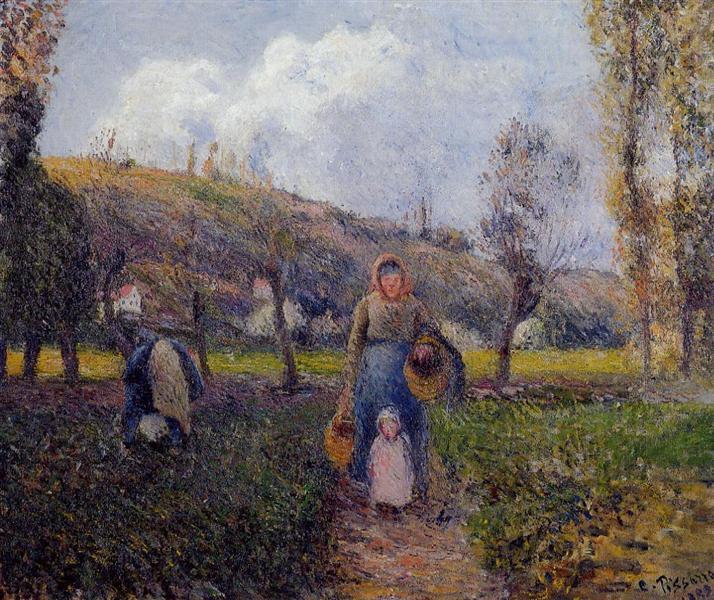תיאור
Camille Pissarro, a fundamental figure in the Impressionist movement, presents us with "Peasant Woman and Child Harvesting the Fields - Pontoise - 1882" a work that embodies the spirit of rural life of his time, marked by his tendency to portray everyday life with vibrant authenticity. In this painting, Pissarro combines his technical mastery with a deep sensitivity towards his characters, revealing hard work and the connection between humans and nature.
The composition reveals a peasant woman, who stands at the centre of the scene, with a small child at her side, involved in the harvesting activity. The figure of the woman, dressed in simple attire that reflects her socioeconomic status, conveys a palpable strength and determination. Her posture, slightly leaning forward, suggests a continuous effort, while her gaze seems to concentrate on the task she is carrying out. The relationship between mother and child suggests an intimate bond and an apprenticeship in the continuity of agricultural work, a recurring theme in agricultural representations of the period. It is moving to observe how the child's education in the agricultural trade is presented as an essential part of his life.
Pissarro uses a colour palette that adheres to the earthy tones characteristic of rural life, with shades of green and yellow representing the growth and ripening of the harvest. Warm and cool tones intertwine in a way that brings the setting to life, where the countryside becomes not just the background but an active participant in the lives of the characters. This intimate association between man and land is a hallmark of Pissarro's work, as he often championed the value of rural labour in a world hurtling towards industrialisation.
The impressionist technique employed by Pissarro is evident in the way the loose, visible brushstrokes bring the textures of the countryside and clothing to life. Natural light reflects off the surfaces of the crops, creating a dynamism that invites the viewer to immerse themselves in the scene. The scattered points of light over the field suggest a warm, sunny climate, accentuating the work of the peasants amidst a radiant environment.
This work not only captures a moment in time, but also embodies a humanistic tone that Pissarro carried throughout his career. His interest in peasant life and his ability to portray it with an air of dignity and respect have positioned him as a champion of the working class in a period of social and economic change. The painting can be seen as a tribute both to the industriousness of rural life and to an era when this labor was in danger of disappearing amidst modern urban transformations.
In the context of Impressionism, Peasant Woman and Child Harvesting the Fields aligns with other works by Pissarro that celebrate simple, authentic country life, such as Peasants Returning from the Harvest or The Ingathering of the Harvest. As we move through time, this work becomes an enduring reminder of the relationship between man and the land, a call to value and appreciate the traditions and work that have formed the basis of human development.
Pissarro's painting, at its core, is not limited to a rural portrait; it is a testament to the beauty of the everyday, a visual statement that resonates across generations and invites us to reflect on the fundamental values underlying work, love and family. In a world that often focuses on acceleration and forgetting roots, this work reminds us of the importance of human connections that flourish in the simplicity of daily work.
KUADROS ©, a famous painting on your wall.
Hand-made oil painting reproductions, with the quality of professional artists and the distinctive seal of KUADROS ©.
Painting reproduction service with satisfaction guarantee. If you are not completely satisfied with the replica of your painting, we will refund 100% of your money.

